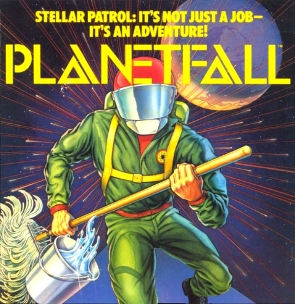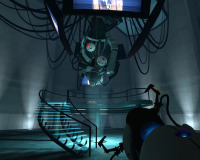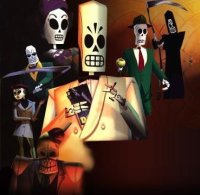Yesterday I spoke to a group of English undergrads at UC Berkeley about my career in video games, about the (sometimes unexpected) ways in which my English degree has helped me in the industry.
One of the great questions that came up during the Q&A afterwards was, "If you were going to teach an English class on video games, what 5 games would be in your syllabus?"
The thing I like about this question is that, although I've spent lots of time thinking about my favorite games from a gameplay standpoint, I haven't really thought that deeply about which were my favorite from a literary standpoint. Which ones told the best stories or had the best writing? Which stretched our ideas of how interactive storytelling might differ from written storytelling?
Unfortunately because I hadn't previously thought about games this way I kind of whiffed on the answer and only came up with two: Valve's Portal and Infocom's Planetfall. Well I've thought about it some more now, and here's what I would have answered:
 Planetfall (Infocom)
Planetfall (Infocom)
As text adventures go this wasn't necessarily the best-written or the cleverest. But I love it still for the way it blended comedy with a sense of isolation, and particularly the manner in which it drove both of those home in the character of Floyd, the service robot who befriends and ultimately gives his "life" so your character can survive.
 Halflife (Valve)
Halflife (Valve)
All of the Halflife games are great, but I'd probably pick the first one for the fact that it broke new ground in immersive storytelling. Who knew you could tell a compelling story in the midst of a fluid and exciting action-game experience without taking a player out of that experience with lame non-interactive cut-scenes and cinematics?
 Portal (Valve)
Portal (Valve)
Maybe it's not cool to have two games by the same company in the top five, but Portal really took the immersive storytelling pioneered in Halflife to the next level. As you first begin to play through the inventive puzzles in Portal you almost don't even realize there's a narrative at all, but Valve reveals a rich backstory and, in GLaDOS, one of the most complex, funny and terrifying characters ever imagined in any medium.
 Shadow of the Colossus (Team Ico)
Shadow of the Colossus (Team Ico)
I actually liked Ico better than SotC, but I think SotC tells a more compelling story. As you seek out and methodically destroy the enigmatic Colossi, your relationship to them evolves in surprising ways. At first it feels heroic and exciting. But as one Colossus after another collapses and falls under your sword, you begin to wonder -- why am I doing this? What did these things ever do to me? Who's really the victim? Best of all, the game never provides a tidy explanation at the end, leaving it to you to work out the answers to these questions for yourself.
 Grim Fandango (Lucas Arts)
Grim Fandango (Lucas Arts)
I'd have to include one game written by Tim Schafer, because I think he's pretty much the single best writer working in the game industry. On one level Grim Fandango is no more literate than a 50's pulp detective novel. But the way it stretches those pulp conventions with tight storytelling, clever dialog, memorable characters, and of course the surprising and delightful mashup of genre fiction and Mexican Day of the Dead iconography makes this game hold up even after all these years.
Hm.......
Honestly I'm still not completely satisfied with this list. There are dozens of games I thought about including and didn't -- Bioshock, the Fallout series, Limbo, Indigo Prophecy... I really wanted to include one of the GTA series, because the quality of Rockstar's storytelling and dialog often surprises people who just think of them as violent panderers. And there are probably a dozen more games that should be in here that are slipping my mind.
Ah well. Consider it a work in progress.



